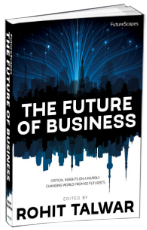Posted at 16:36h
in
Education
by Anne Boysen
[caption id="attachment_2257" align="alignleft" width="326"]

Future graduation attire?[/caption]
Appealing to the hearts and minds of the
Homelander kids (post-millennials) happens by addressing their taste for technology and modern communication devices. Growing up with touchscreens as the main window to the world, these kids are seriously steeped in a lifestyle and educational agenda that revolves around digital - where technologies are used as learning devices (educational platforms), often through
gamified experiences, as well as study objects (coding, programming). For-profit university Ashford University does a good job at mining this sentiment in
a commercial featuring children caressing their devices like they did their teddy bears a few years earlier. The message is clear: To be relevant and effective with the class of 2025 education needs to live in the tablets and smart phones, or soon bionic lens projections. The commercial revolves around catchwords like "smart" and "bright", words recent surveys show cling well in the ears of kid today. So much in fact, that smart as an aspirational goal is overpowering any other superhero power that previous generations of kids used to idolize.




 "Hey guys. I just wanted to ask - just a random question. Uhmm. Am I - like - ugly or pretty?"
- You don't have to dig deep into online archives to find a whole pageantry of kids as young as 10 years old unloading their most personal angst for complete strangers to comment on. And the more insecure they appear, the more likely they seem to attract trolls whose dubious netiquette allows them to filter through comments of this type: "DONT WANT TO SOUND MEAN BUT URE A F***ING DOG." (censoring added). In other words, the ones who most desperately need reassurance from their faceless peers are the ones who are the most likely get bulldozed by the 'Haters'. And rarely do any respondents care to unmask the more existential questions that simmer immediately underneath the Snow White narrative: “Am I likeable? Am I loveable?”
"Hey guys. I just wanted to ask - just a random question. Uhmm. Am I - like - ugly or pretty?"
- You don't have to dig deep into online archives to find a whole pageantry of kids as young as 10 years old unloading their most personal angst for complete strangers to comment on. And the more insecure they appear, the more likely they seem to attract trolls whose dubious netiquette allows them to filter through comments of this type: "DONT WANT TO SOUND MEAN BUT URE A F***ING DOG." (censoring added). In other words, the ones who most desperately need reassurance from their faceless peers are the ones who are the most likely get bulldozed by the 'Haters'. And rarely do any respondents care to unmask the more existential questions that simmer immediately underneath the Snow White narrative: “Am I likeable? Am I loveable?”  Lenore Skenazy, aka "America’s Worst Mom" and creator of the name and movement
Lenore Skenazy, aka "America’s Worst Mom" and creator of the name and movement 
